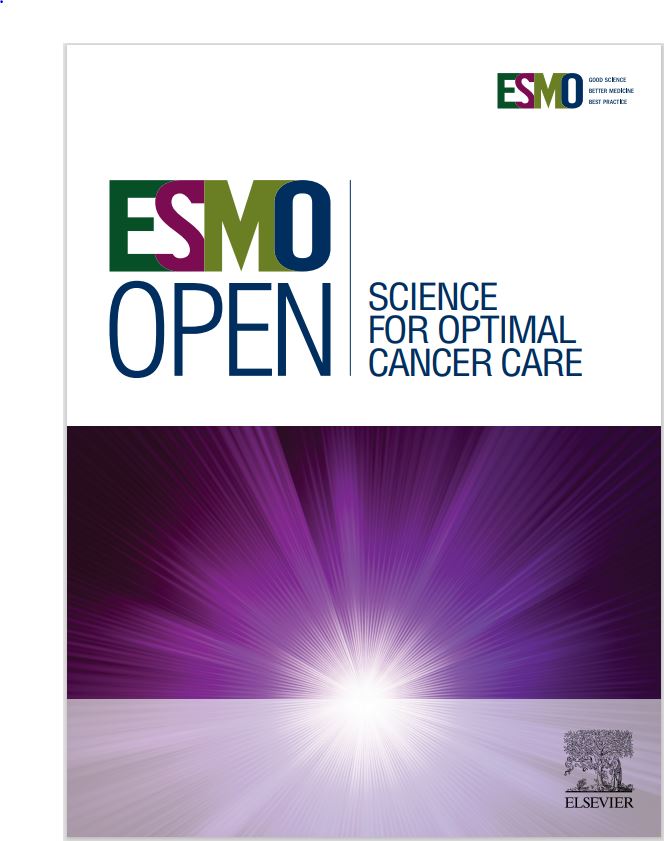Molecular tumour board in gastrointestinal cancers
IF 7.1
2区 医学
Q1 ONCOLOGY
引用次数: 0
Abstract
Background
Comprehensive genomic profiling (CGP) is being increasingly adopted in clinical practice to guide the use of molecularly guided treatment options (MGTOs). To optimize the integration of MGTOs in routine cancer care, molecular tumour boards (MTBs) have been established. Limited data are available to address the clinical value of implementing MTBs to inform treatment decision making in patients with gastrointestinal (GI) cancers.
Materials and methods
We retrospectively retrieved medical records from patients with advanced GI cancers discussed at the European Institute of Oncology’s MTB between August 2019 and December 2024. We evaluated clinical outcomes resulting from applying MGTOs in cancer care according to MTB recommendations, describing real-world progression-free (rwPFS) and overall survival (OS), and used the growth modulation index (GMI) (ratio of PFSMTB to PFSprior) to quantify the effectiveness of MTB’s recommended cancer treatment in extending PFS.
Results
Among 192 patients with GI cancers discussed at MTB, 139 (72.3%) received an MTB treatment recommendation. For patients with available follow-up data (n = 82), 31 patients (41.4%, 17.7% overall) received MGTOs, while 51 patients received standard treatments. Patients receiving MGTOs exhibited a longer rwPFS compared with cases receiving standard therapies [5.35 versus 3.55 months, hazard ratio (HR) 0.62, 95% confidence interval (CI) 0.36-1.08, P = 0.08] and with unmatched cases showing actionable biomarkers but not treated with targeted agents (n = 31) (rwPFS 5.35 versus 2.40 months, HR 0.49, 95% CI 0.27-0.90, P = 0.02). The use of MGTOs resulted in a GMI of 1.12 (interquartile range 0.68-2.36). The European Society for Medical Oncology (ESMO) Scale for Clinical Actionability of molecular Targets (ESCAT) tier I-III treatments resulted in a restricted mean PFS gain of 4.87 months compared with standard therapies (95% CI 1.02-8.72 months, P = 0.01). No OS difference was observed between patients receiving MGTOs and standard treatments (P = 0.89).
Conclusions
Our results suggest that MTB-informed clinical decision making could provide valuable clinical benefits and expanded therapeutic options in patients affected by advanced GI cancers.
求助全文
约1分钟内获得全文
求助全文
来源期刊

ESMO Open
Medicine-Oncology
CiteScore
11.70
自引率
2.70%
发文量
255
审稿时长
10 weeks
期刊介绍:
ESMO Open is the online-only, open access journal of the European Society for Medical Oncology (ESMO). It is a peer-reviewed publication dedicated to sharing high-quality medical research and educational materials from various fields of oncology. The journal specifically focuses on showcasing innovative clinical and translational cancer research.
ESMO Open aims to publish a wide range of research articles covering all aspects of oncology, including experimental studies, translational research, diagnostic advancements, and therapeutic approaches. The content of the journal includes original research articles, insightful reviews, thought-provoking editorials, and correspondence. Moreover, the journal warmly welcomes the submission of phase I trials and meta-analyses. It also showcases reviews from significant ESMO conferences and meetings, as well as publishes important position statements on behalf of ESMO.
Overall, ESMO Open offers a platform for scientists, clinicians, and researchers in the field of oncology to share their valuable insights and contribute to advancing the understanding and treatment of cancer. The journal serves as a source of up-to-date information and fosters collaboration within the oncology community.
 求助内容:
求助内容: 应助结果提醒方式:
应助结果提醒方式:


